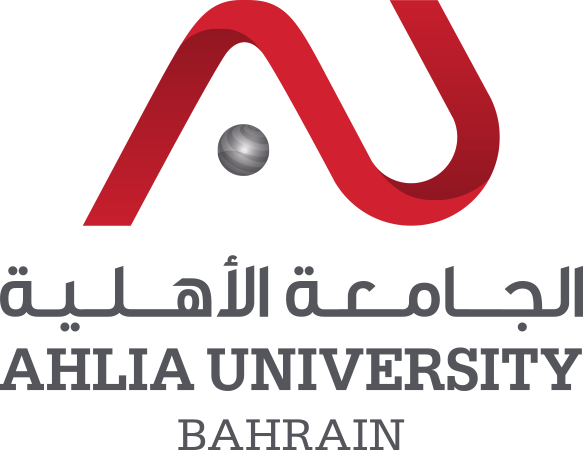
Goal 17 / 17.4 / 17.4.2
University's Outreach Education for the Wider Community
Ahlia University: Embedding Sustainable Development Goals (SDGs) in Education
Introduction: Commitment to Sustainability in Education
Ahlia University (AU) has made sustainability and social responsibility core to its mission, aligning with the United Nations 2030 Agenda. In recent years, AU developed a Sustainable Development Plan (2021–2025) to embed SDGs across teaching, research, and community engagement ahlia.edu.bh ahlia.edu.bh. The University strategically selected seven priority SDGs to integrate into curricula and activities, emphasizing quality education, equal opportunity, and sustainable growth ahlia.edu.bh. As a result, Ahlia was recognized as a UN partner in achieving these goals ahlia.edu.bh. This report details AU’s educational offerings related to sustainability over the past five academic years – including dedicated programs, integrated coursework, co-curricular trainings, and interdisciplinary initiatives – highlighting how these efforts align with global SDG education goals.
Sustainable Development Goals
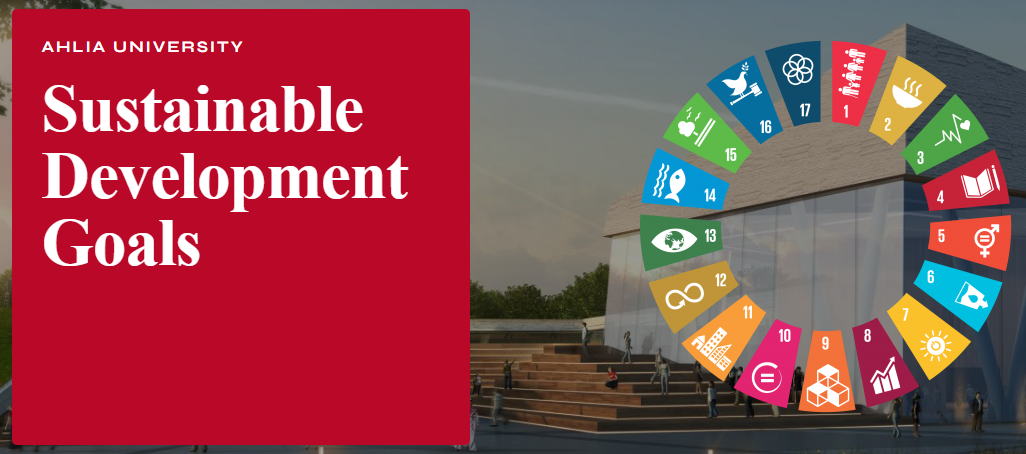
SDGs commitment
AU developed Sustainable Development Plan (2021-2025), the plan is developed to reflect AU’s commitment towards UNSDGs and to contribute to National Strategies as well as International Standards.
This plan is committed to contribute to national strategies and Initiatives (2030) and create an impact at National, Regional and International Level for sustainable future for our next generations.
The plan is focused on SDGs as a priority, AU carefully selected the 7 SDGs with assurance of its relationships with national strategies and government directions, AU emphasis on Quality Education and providing a sustainable future for all and promotes UNSDGs to be part of its core functions, teaching and learning, research as well as community.
Integrating Education Sustainable Development (ESD) Skills within Academic Programs:
Ahlia University academic programs was revised with a consideration of Educational for Sustainable Development (ESD) Framework by UNESCO. AU aligned the ESD competencies with AU graduate attributes with a focus on key skills including (adaptability, personal resilience, connectivity, engagement, negotiation, global citizenship, research, ethics and innovation). The key skills are integrated within courses through specific intended learning outcomes related to knowledge, applied skills, critical thinking and general and transferable skills. The courses are carefully crafted with assurance of learning cascaded across 4 years of study, the learning outcomes are assessed through direct and in-direct assessments. The integration of UNSDGs within the curriculum enabled generating 217 published research studies with recommended conclusions to support the society and policy making.
Conducting Annual Conferences tackling UNSDGs
Ahlia University in collaboration with Brunel University of London and University of Business and Technology (KSA) is conducting the annual conference tackling Equal Opportunities in the fields of Business and Technology. The conference attracted 170 researchers from 27 different countries including GCC, UK, USA and Africa. The conference also attracts policy makers from regulatory authorities including the Supreme Council of Women to discuss vital topics related to women empowerment, gender equality etc. The outcome of the conference includes publishable research in Scopus indexed proceeding.
Voluntary Reporting of AU’s Commitment:
Ahlia University is committed to knowledge sharing therefore, AU reports annually the major achievements against UNSDGs and share it voluntary through United Nations Higher Education Sustainability Initiative (HESI) Platform. The platform includes progress tracking on the committed actions which includes integration of UNSDGs in the curriculum to support UNSDG4. For more information, please see: UN HESI – Platform Commitment Ahlia University Sustainability Initiative | Department of Economic and Social Affairs
Dedicated Academic Programs in Sustainability (Standalone Offerings)
Ahlia University has introduced full-fledged academic programs wholly focused on sustainability and sustainable development topics, ensuring students can specialize in these fields:
- Master of Science in Sustainable Management (MSSM) –
Launched under the College of Business & Finance, this 36-credit master’s program is explicitly derived from the United Nations SDGs, with a focus on sustainable business practices ahlia.edu.bh. The MSSM curriculum covers executive leadership, sustainable governance, digital transformation, and strategic innovation for “green” businesses ahlia.edu.bh. Uniquely, students may choose between two streams – (1) Luxury Brand Management or (2) Circular Economy Management – linking sustainability concepts to real-world industry contexts ahlia.edu.bh. The program’s aim is to produce graduates adept in sustainable business strategy, crisis management, and digital innovation, aligned with Bahrain’s Economic Vision 2030 ahlia.edu.bh. Graduates are prepared for roles such as Sustainability Strategy Manager, Environmental Consultant, or Sustainability Specialist in various sectors ahlia.edu.bh.

- Master of Science in Sustainable Interior Design (MSID) –
Offered by the College of Arts & Science, this specialized master’s program trains professionals in sustainable design of interior environments. The MSID curriculum spans innovative eco-friendly building materials, green construction methods, energy efficiency and thermal comfort, and sustainable interior strategies ahlia.edu.bh ahlia.edu.bh. Students learn to design resilient, healthy residential and commercial spaces that meet high-performance building standards and environmental codes ahlia.edu.bh ahlia.edu.bh. By covering topics like Constructing the Green Interior and Environmental Systems for the Sustainable Interior, the program prepares graduates to assume leadership roles in developing energy-efficient, environmentally responsible interiors ahlia.edu.bh ahlia.edu.bh. Career pathways include sustainability consultant, interior environmental architect, and similar roles driving sustainable design solutions ahlia.edu.bh.
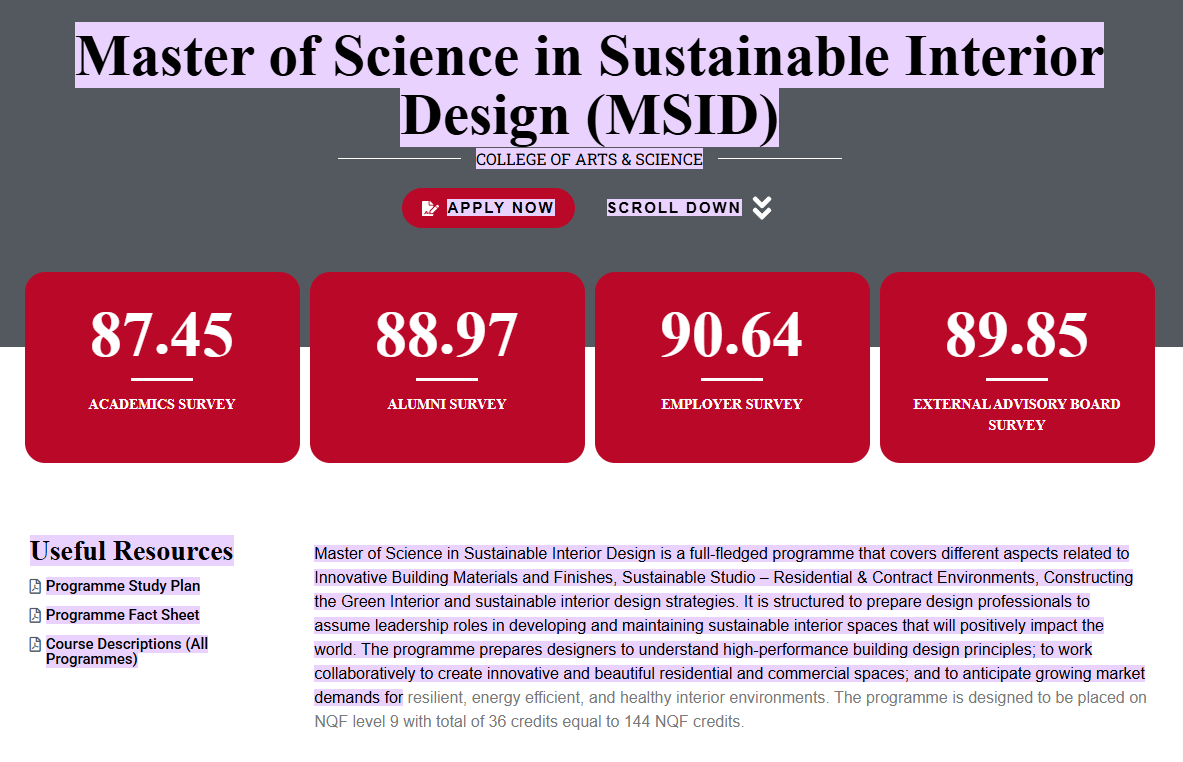
These postgraduate programs – both introduced within the last five years – underscore AU’s commitment to offering advanced education centered entirely on sustainability principles. Through coursework and research projects, students tackle SDG-related challenges (e.g. sustainable cities, responsible production, climate action in design, etc.) as the primary focus of their degrees. The creation of such programs demonstrates Ahlia’s leadership in preparing sustainability professionals for the global workforce.
Integrating SDG Principles Across the Curriculum
Beyond dedicated programs, Ahlia University systematically integrates SDG principles into a wide range of courses and programs across faculties. In 2019–2023, Ahlia undertook a comprehensive curriculum review to infuse Education for Sustainable Development (ESD) competencies into its undergraduate and graduate offerings. This process was guided by UNESCO’s ESD framework and aligned with AU’s graduate attributes ahlia.edu.bh. Key sustainability skills – such as adaptability, resilience, global citizenship, ethical reasoning, and innovation – were mapped into course learning outcomes and assessments for each year of study ahlia.edu.bh. The result is that many courses now explicitly address environmental, social, or economic dimensions of the SDGs, ensuring every AU student gains sustainability knowledge and skills as part of their degree.

For example:
- Business & Finance:
The College of Business integrates SDG-related content through courses like Ethics and Professional Practice in Business, which gives students a foundation in business ethics and corporate social responsibility (CSR). Through case studies and discussions of real-world dilemmas, students learn about ethical decision-making and the cost of unethical behavior, and they receive a comprehensive overview of CSR principles and sustainable business practices ahlia.edu.bh ahlia.edu.bh. Similarly, the Master of Financial Technology program includes FinTech Ethics and Risks, highlighting responsible innovation and social impacts of new technologies ahlia.edu.bh ahlia.edu.bh. These courses link to SDG8 (Decent Work and Economic Growth) and SDG16 (Peace, Justice & Strong Institutions) by emphasizing ethics, anti-corruption, and good governance in business.


- Information Technology & Engineering:
Technical programs incorporate sustainability mainly through focus on innovation and efficiency. Notably, Ahlia’s Bachelor of Science in Computer and Communication Engineering and Mobile Network Engineering address energy-efficient technologies and green IT within relevant electives, aligning with SDG7 (Affordable & Clean Energy) and SDG9 (Industry, Innovation & Infrastructure). In the College of IT, emerging topics like artificial intelligence and robotics are examined in light of societal impact and ethics – preparing students to innovate responsibly for SDG-oriented solutions. (For instance, see the interdisciplinary student debate described later on the role of robotics in achieving SDGs).
- Arts, Design & Architecture:
The Interior Design program provides a strong example of embedded environmental sustainability content at the undergraduate level. Core courses include Materials & Application in Design, which focuses on sustainable and recycled materials for interiors, and Building Systems & Interior Codes, emphasizing green building practices and compliance with environmental standards ahlia.edu.bh. Through these courses, interior design students learn to consider life-cycle impacts of materials, energy use, indoor environmental quality, and LEED or other green certifications as part of their design process ahlia.edu.bh. This directly supports SDG11 (Sustainable Cities & Communities) and SDG12 (Responsible Consumption & Production) by training designers to create spaces that are resource-efficient and healthy. At the master’s level, the entire MSID program builds on this foundation to deepen sustainable design expertise (as detailed above).
Undergraduate Courses
Ahlia University incorporates sustainability themes into various undergraduate programs. For instance, the Bachelor's degree in Interior Design includes courses such as "Materials & Application in Design," which focuses on sustainable materials and their applications in interior spaces. Additionally, courses like "Building System & Interior Codes" emphasize sustainable building practices and compliance with environmental standards. These courses aim to equip students with knowledge and skills related to sustainable design and environmental considerations in their respective fields.
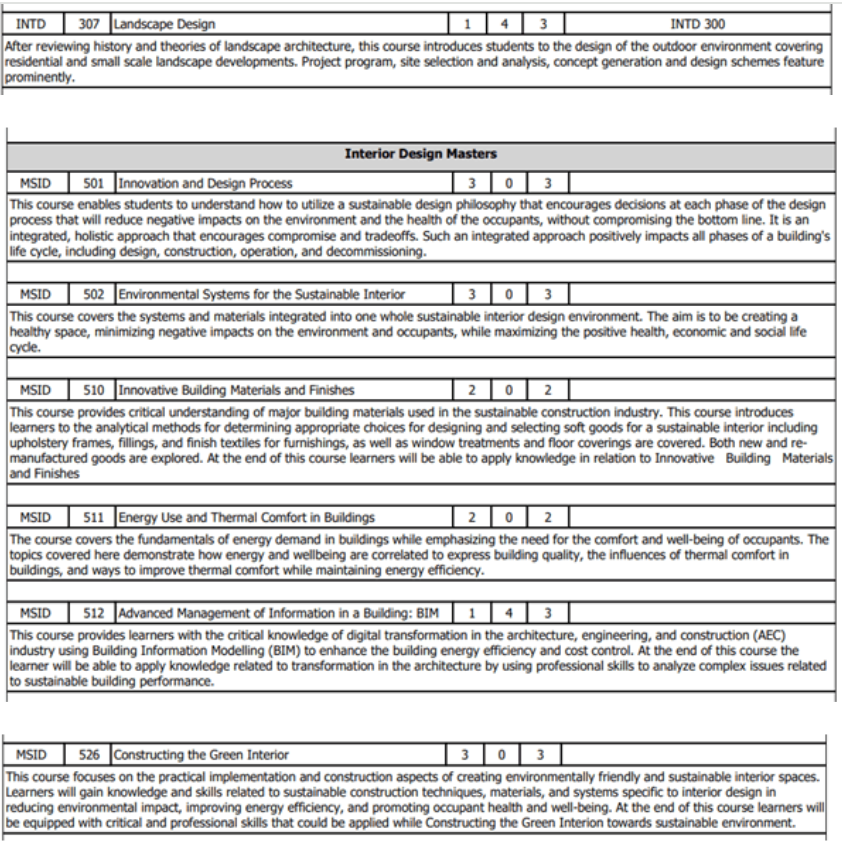

Postgraduate Programs
At the postgraduate level, Ahlia University offers specialized programs that delve deeper into sustainability and environmental management:
Master of Science in Sustainable Interior Design (MSID):
This program is designed to prepare design professionals to develop and maintain sustainable interior spaces. It covers topics such as innovative building materials, energy use and thermal comfort in buildings, and building performance assessment, aiming to create environmentally responsible and energy-efficient interior environments.

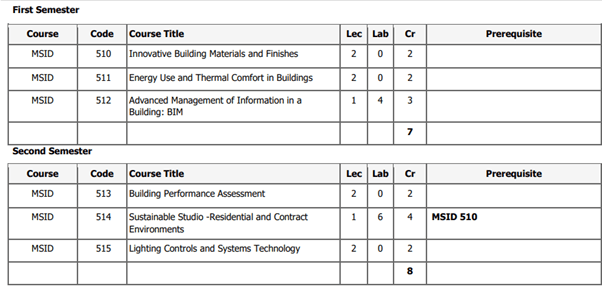

- Social Sciences & Humanities:
Courses in law, ethics, and social science address SDG principles such as gender equality, human rights, and public health. For example, Equal Opportunities in Public Life (EOPL 112) is an interdisciplinary course highlighting Bahrain’s efforts in gender equality and women’s empowerment, examining legislation (e.g. the National Action Charter) and initiatives of the Supreme Council for Women ahlia.edu.bh. It explicitly connects students with SDG 5 (Gender Equality) by reviewing how empowering women and achieving gender balance contributes to “comprehensive development in accordance with the UN 2030 Sustainable Development Goals” ahlia.edu.bh. Likewise, Principles of Human Rights (HUMR 101) introduces international human rights conventions, reflecting SDG16’s calls for peace, justice, and strong institutions. In the College of Medical & Health Sciences, programs like Physiotherapy and Nutrition & Dietetics incorporate community health promotion, disease prevention, and well-being – directly reinforcing SDG3 (Good Health & Well-Being).
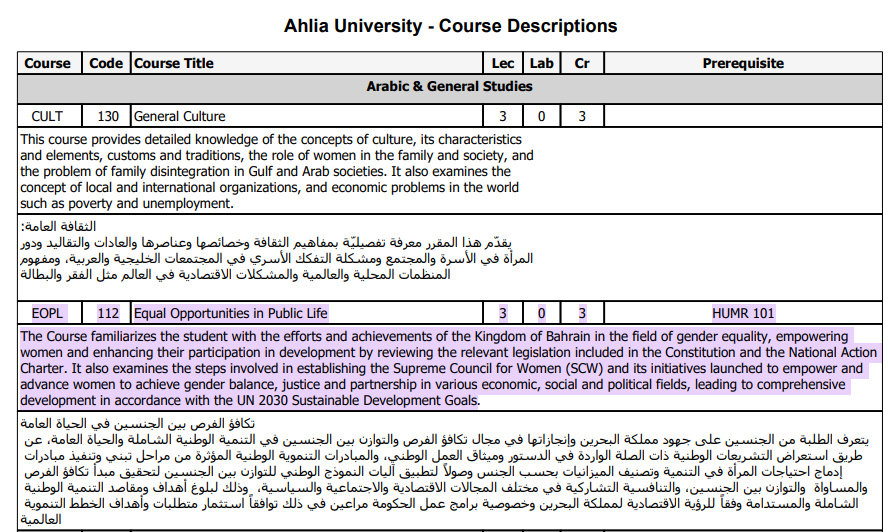
- Economics & Entrepreneurship:
The curricula of Banking, Finance, and Economics majors are linked to SDG-oriented topics in development and policy. For instance, finance students study sustainable investing and ethical finance practices, touching on SDG12 and SDG13 (Climate Action) when considering the environmental, social, and governance (ESG) criteria in investments. Furthermore, entrepreneurship education is a common thread across Ahlia’s programs – the University made the study of entrepreneurship a requirement for all students as part of modernizing education ahlia.edu.bh. By instilling entrepreneurial skills and mindset (e.g. creativity, problem-solving, social enterprise), Ahlia prepares graduates to drive sustainable economic growth and innovation (SDG8 and SDG9). This cross-cutting emphasis is evidenced by the activities of the Ahlia Centre for Entrepreneurship and student clubs focused on start-up ideas that tackle societal challenges.
The study of entrepreneurship is a fundamental requirement in all Al-Ahlia University programs.
Deputy President of Al-Ahlia University, Professor Mukhtar Al-Hashemi, affirmed the academic, research, and practical presence of entrepreneurship in all the university's activities and programs. He pointed out that the university has made significant progress in instilling the values, concepts, and trends of entrepreneurship across its various programs and specializations. This is based on the belief in the importance of preparing its graduates to engage in entrepreneurship, equipping them with all the necessary knowledge and skills. This approach aligns with the strategies of the General Secretariat of Higher Education and the features of modern education that the university is committed to providing.
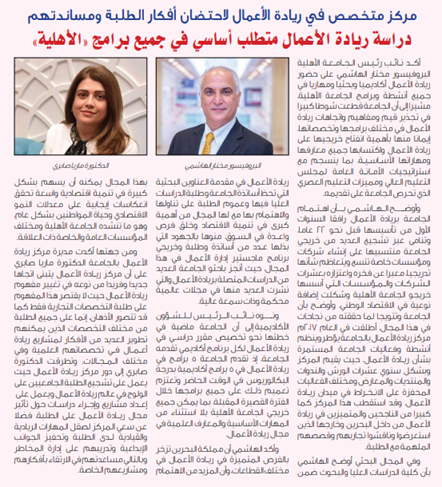
Ahlia’s approach ensures that nearly every academic program engages with one or more SDGs in its content or learning outcomes. According to the university’s own SDG mapping, undergraduate degrees from physiotherapy and mass communications to finance and information technology each contribute to various goals ahlia.edu.bh ahlia.edu.bh. For example, the Mass Communication & PR program addresses gender equality (SDG5) and decent work (SDG8) through media ethics and communication for development; the Banking & Finance and Economics programs incorporate topics on sustainable economic growth (SDG8), sustainable communities (SDG11), responsible consumption (SDG12), and strong institutions (SDG16) in courses on development economics and corporate governance ahlia.edu.bh ahlia.edu.bh. Such integration across disciplines reflects Ahlia University’s holistic commitment to graduate sustainability-literate students. As the University states, it provides an “active student-centered learning environment in which sustainability is actively supported,” ensuring graduates gain the perspectives and skills to address real-world environmental and social challenges ahlia.edu.bh ahlia.edu.bh.



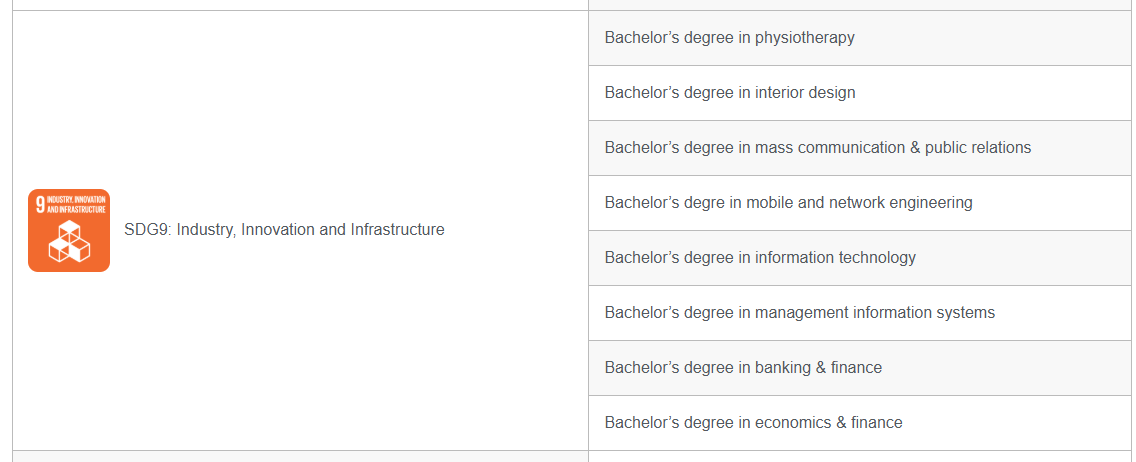

Short Courses, Workshops, and Certificate Programs on SDG Themes
Ahlia University extends its sustainability education beyond formal curricula through short courses, training workshops, and public programs that target both students and the broader community. Over the past five years, AU has organized and participated in numerous events and non-degree programs aligned with SDG themes, for example:
- Professional Training Workshops:
In partnership with the World Association for Sustainable Development (WASD), Ahlia has co-hosted regular training workshops focusing on key factors in human development and capacity building in Bahrain and the Gulf region. These short courses, often open to professionals and the public, cover topics such as “Executive Leadership and Performance Improvement in the Public and Private Sectors” and “Global Business Environment and Entrepreneurship,” among others wasd.org.uk. Through these workshops, participants develop skills in innovative leadership, economic diversification, and entrepreneurship – all crucial for sustainable development. Such capacity-building programs support SDG4 (Quality Education) and SDG8 (Decent Work) by upskilling the workforce in sustainable practices. Additionally, Ahlia’s faculty contribute to community seminars like the Meridian Series on Innovation and Development, highlighting the role of human capital and innovation in economic sustainability wasd.org.uk. These offerings illustrate AU’s role as a hub for lifelong learning on sustainability issues.

- Public Lectures and Conferences:
AU frequently hosts open seminars and international conferences on sustainability topics. In 2022, for instance, Ahlia convened the 6th Equal Opportunities Conference with a special focus on “Sustainable Leadership and Technology Innovation Management.” This conference – part of an annual series – attracted researchers from 20 countries and examined research aligned with multiple SDGs (SDG3, 4, 5, 8, 11, 17) ahlia.edu.bh. By tackling issues from health and education quality to gender equality and sustainable cities, and sharing the findings with policymakers, these conferences extend the impact of Ahlia’s academic work to the public realm. The University has also organized or sponsored talks on renewable energy, climate action, and the Fourth Industrial Revolution’s implications for the SDGs (often in collaboration with the United Nations country office or industry partners), thereby raising awareness and knowledge of sustainability challenges in the wider community. Such events are typically open to students, academics, industry, and the general public, underscoring Ahlia’s community engagement mission in line with SDG17 (Partnerships for the Goals).
6th Equal Opportunities Conference
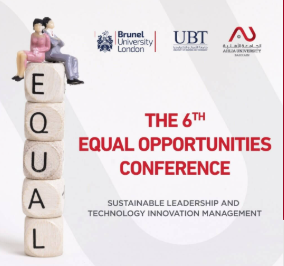
The 6th Equal Opportunities Conference “Sustainable Leadership and Technology Innovation Management” is organized by Ahlia University in collaboration with Brunel University London and the University of Business and Technology KSA, the conference will take place 6th -8th February 2023, Wyndham Grand Manama, Manama, Bahrain.
The Conference aims to gather leading academics, professionals, scholars, and researchers to share their knowledge and new ideas and discuss current developments in the field of Sustainable Leadership and Technology Innovation Management focusing on Equal Opportunities in relation to leadership and sustainable management. This conference aims to shed the light on topics related to the use of technology and innovation management that could support business sustainability and leadership engagement.
The conference aims to tackle issues related to the following aspects:
· Assess the impact of sustainable leadership, technology, and innovation on organizational effectiveness.
· Shed light on different sustainable leadership practices in relation to the use of digital sustainability, technology, and innovation.
· Publish high-quality research that focuses on sustainable leadership in a transformative environment covering various contextual factors.
· Act as a guide for scholars, practitioners, and policymakers while devising or revising policies and procedures related to United Nations Sustainable Development Goals.
- Student Workshops and Competitions:
Ahlia’s co-curricular programming includes workshops and competitions that encourage students to apply SDG concepts in practice. The Ahlia Invention Center’s “We Invent” Hackathon (2022), for example, challenged students to develop innovative solutions (often tech-driven) to real-world problems, implicitly supporting goals like industry innovation (SDG9) and sustainable cities (SDG11). Similarly, the university’s participation in the regional Inter-Collegiate Environmental Public Speaking Competition (run by the Emirates Environmental Group) has given students opportunities to research and debate environmental sustainability topics ahlia.edu.bh ahlia.edu.bh. Ahlia teams have engaged in this competition – which aims to “promote a positive attitude change among the young… and establish an environmentally-conscious generation” – thereby honing their communication skills on issues of resource sustainability and environmental protection ahlia.edu.bh. Through these experiences, students earn certificates or recognition that supplement their academic credentials, while reinforcing their understanding of SDG13 (Climate Action), SDG6 (Clean Water), SDG7 (Clean Energy), etc.
Ahlia University’s Participation in the 15th Inter College Environmental Public Speaking Competition, organized by the Emirates Environmental Group (EEG).
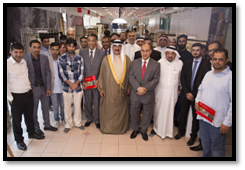
The Inter College Environmental Public Speaking Competition was held for the first time in 2001 and since then has proven to be highly popular across the GCC region. Its primary aim is to ensure sustainability of environmental resources by promoting a positive attitude change among the young in our societies and establishing an environmentally-conscious generation. The 2015 cycle was held on November 23rd - 24th 2016 at Dubai Knowledge Village. Fifty-seven teams representing Gulf universities, colleges of higher and further education participated in the competition.
- Community Outreach Programs:
Ahlia also integrates SDG themes into community service workshops. Initiatives like the “Together S.A.F.E.” campaign – led by Ahlia students under faculty supervision – took a public outreach approach to promote tolerance, peace, and anti-extremism, echoing the values of SDG16 (Peace, Justice) wasd.org.uk wasd.org.uk. Students designed and delivered workshops and events beyond campus to spread messages of social cohesion (“Stand Against Fear and Extremism”), demonstrating how classroom learning about ethics and social responsibility translates into civic action. Moreover, health and well-being campaigns (e.g. World Diabetes Day awareness events, blood donation drives, “Iftar on the Road” Ramadan charity drives) have been organized by the Student Affairs department to educate the public on health (SDG3) and hunger (SDG2) issues ahlia.edu.bh ahlia.edu.bh. These short-format programs and volunteer workshops instill a sense of global citizenship in students and provide tangible benefits to the community.
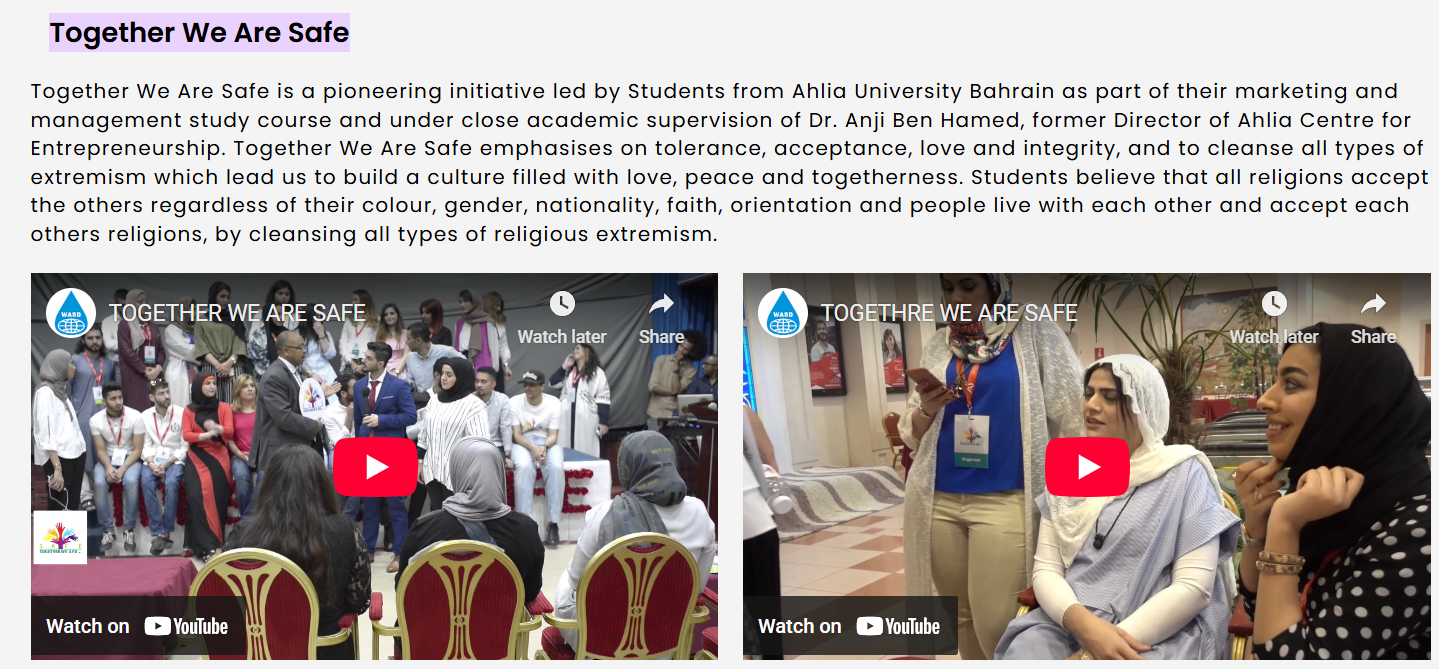
World Diabetes Day
On November 16, a ceremony was held at the Princess Sabeeka bint Ibrahim Park in Awali marking World Diabetes Day which falls on the 14th of November
The SCH chief addressed the ceremony marking World Diabetes Day, being held this year under the theme: ’Family and Diabetes’. He stressed the crucial role of the family in promoting prevention from the disease. He warned against the alarming increase of the prevalence of diabetes in the Kingdom of Bahrain, which has health, social and economic repercussions on the community and threatens national sustainable development, where the Ahlia students participated.
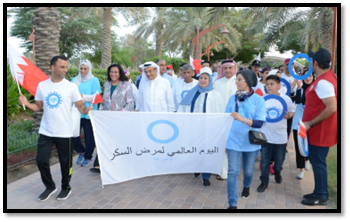
Through the above short courses and workshops, Ahlia ensures that SDG education is not confined to credit-bearing classes. Both students and the public have access to learning opportunities about sustainability – whether it’s via a professional training seminar on sustainable business or a student-led campaign on social inclusion. This outreach reflects Ahlia University’s belief that universities should serve as lifelong learning centers and engines of societal change, consistent with the spirit of the SDGs.
Interdisciplinary and Research-Led SDG Education
A hallmark of Ahlia University’s approach is fostering interdisciplinary learning and research-led teaching around sustainable development. Recognizing that SDG challenges cut across traditional disciplines, AU creates platforms for students and faculty from different fields to collaborate on and debate sustainability topics. These efforts not only enrich the curriculum but also align with Times Higher Education (THE) Impact Rankings criteria by demonstrating how Ahlia’s education and research directly contribute to SDGs.
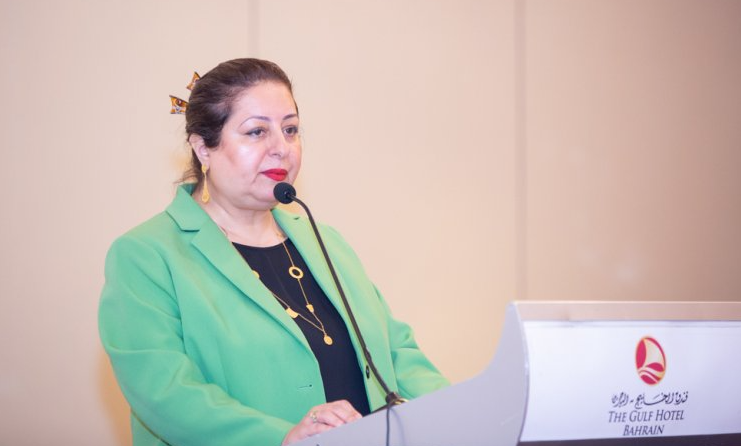
Dr. Wasan Awad, Dean of Ahlia’s IT College, speaking at the 2024 student debate on “The Implications of Robotics on Achieving the SDGs.”
One notable initiative was the Interactive Student Debate on Robotics and
SDGs held in April 2024, organized by the College of Information Technology
in partnership with the UN in Bahrain. This event brought together students,
faculty experts, and industry judges to examine how emerging technologies (like
artificial intelligence and robotics) can aid or hinder the achievement of the
17 SDGs ahlia.edu.bh ahlia.edu.bh. Sixteen top students from Ahlia and other Bahraini
universities formed teams to argue opposing viewpoints – one side highlighting
the positive contributions of robotics to sustainable development, and the
other cautioning about potential downsides ahlia.edu.bh ahlia.edu.bh. The debate was research-driven: participants backed
their arguments with studies, statistics, and examples of how automation
impacts jobs, education, healthcare, renewable energy, and more ahlia.edu.bh ahlia.edu.bh. Through this exercise, students from IT, business,
and engineering disciplines learned from each other and gained a nuanced
understanding of technology’s role in society. As Dr. Wasan Shaker Awad (Dean
of IT) noted, such debates “acquaint [students] with pressing global issues
such as the SDGs, and provide insights into the impact of technology on society
and future challenges” ahlia.edu.bh. This interdisciplinary pedagogy hones critical
thinking and ensures graduates can approach SDG problems – like climate change
or inequality – from multiple angles, an essential skill set identified by SDG
4.7 (education for sustainable development).
Dr. Wasan Awad: “Ahlia’s Talented Students Endorse Robots’ Humanitarian Role in Student Debate”
Dr. Wasan Shaker Awad, the Dean of the College of Information Technology at Ahlia University, expressed the college’s commitment to fostering innovative education through the debates and workshops. Recognising their positive influence on students’ personal skills, these initiatives also enhance students’ scientific research proficiency, acquaint them with pressing global issues such as the Sustainable Development Goals (SDGs), and provide insights into the impact of technology on society and future challenges in the field.
The College of Information Technology at Ahlia University recently hosted an interactive student debate, held at the Gulf Hotel, which was attended by Professor Abdullah Al-Hawaj, the Founding President and Chairman of the Board of Trustees of Ahlia University, Professor Mansoor Alaali, the University President, a panel of specialists, keynotes and guests’ speakers, researchers, and IT students from various Bahraini universities and schools. The debate centred around the integration of robots in achieving the United Nations SDGs and aimed to promote critical thinking among students and researchers. Distinguished debate judges and experts from Bahrain and abroad participated, sharing their thoughts on future prospects in the technology field.
Sixteen talented students, divided into two teams of eight, engaged in an exchange of arguments and counter-arguments. Both teams substantiated their viewpoints and decisions based on studies, statistics, and recent research pertaining to robot activities and the global impact of artificial intelligence in the context of accomplishing the sustainable development goals.
Despite the numerous advantages offered by robots, the opposing team emphasised the concerns arising from the potential loss of a substantial number of jobs and roles due to the presence of robots, occurring possible crises. They argued that the emergence of new jobs necessitates novel skills, education, and training to adapt to the new jobs requirements, particularly in education, medicine, and business. The opposing team contended that this trend could aggravate unemployment, especially in developing countries heavily reliant on achieving the SDGs.
Notwithstanding the opposing arguments, the debate concluded with the victory of the supporting team who were successfully demonstrated that robots, like any human innovation or advanced industry, have both positive and negative effects.
The winning team emphasised that responsible robot usage depends on the data and values embedded in their systems. As robots are created by humans, it is the quality and utilization of data that determine whether robots contribute to societal progress or pose a threat to it.
Furthermore, team members highlighted the robots’ contributions to the sustainable development and efficient agricultural methods, the generation of renewable energy, and the optimization of solar power plant operations. Additionally, robots were identified as effective contributors to water resource management, mitigation of natural disasters, and the promotion of educational activities.
Ahlia’s annual Equal Opportunities conference series (mentioned earlier) is another example of research-led education feeding back into teaching. The 2022 conference on sustainable leadership and tech innovation not only produced academic papers and policy recommendations, but also enriched classroom content across faculties. Faculty who participated brought case studies from the conference into their lectures, demonstrating real-world applications of SDG research in business, IT, and public policy courses. Likewise, Ahlia encourages faculty and postgraduate students to undertake interdisciplinary research on sustainability – spanning topics like smart cities (SDG11), financial crises and environment (SDG8 & SDG13), and social inclusion – often in collaboration with international partners wasd.org.uk wasd.org.uk. The university’s recently established Sustainable Research Centre provides a dedicated hub for environmental sustainability research and knowledge exchange, fostering projects that involve students from science, engineering, and finance backgrounds working together on sustainability innovations ahlia.edu.bh. This research center and Ahlia’s involvement in global sustainability networks (e.g. the Higher Education Sustainability Initiative) ensure that teaching is up-to-date and evidence-based. Coursework frequently incorporates Ahlia’s own research findings or locally relevant SDG case studies, making the learning experience more impactful. For instance, business students analyze outcomes from Ahlia’s studies on the Bahraini economy’s diversification (relating to SDG8), while health sciences students might examine data from AU’s community health initiatives (SDG3).


In summary, Ahlia University’s interdisciplinary education efforts – from multi-college student projects and debates to research-informed curriculum enhancements – cultivate a learning environment where sustainable development is understood in a broad, interconnected context. Students graduate not only with disciplinary expertise, but also with the ability to collaborate across fields and apply research to solve complex sustainability problems. This aligns closely with the SDGs’ call for partnership and innovation, as well as with THE Impact Ranking’s emphasis on universities as contributors to global solutions.
Conclusion: Aligning Education with Global SDG Goals
Over the last five academic years, Ahlia University has demonstrated a strong and multifaceted commitment to embedding the SDGs into its educational offerings. From stand-alone programs in Sustainable Management and Design, to SDG-integrated courses across all faculties, to public workshops and interdisciplinary projects, AU ensures that sustainability is a thread running through the entire educational experience. These initiatives explicitly support global targets like SDG4.7, which encourages integrating sustainable development into education at all levels. They also reflect Ahlia’s strategic priorities and Bahrain’s national vision for sustainable development.
Importantly, Ahlia’s efforts are well-documented and publicly accessible – through course catalogs, university websites, and published reports – providing transparency and evidence of impact. The University’s SDG course catalog excerpts show, for example, how a course on gender equality ties to UN goals ahlia.edu.bh, or how interior design syllabi emphasize sustainable materials ahlia.edu.bh. Annual SDG reports (2020–2023) and sustainability policy documents further highlight curriculum revisions, faculty training in ESD, and hundreds of student research projects contributing to SDG solutions ahlia.edu.bh ahlia.edu.bh. By voluntarily reporting its progress on platforms like the UN Higher Education Sustainability Initiative, Ahlia benchmarks itself against international standards and shares best practices ahlia.edu.bh. All of these actions illustrate that Ahlia University not only teaches about sustainable development – it actively practices it through its pedagogy and operations.
In conclusion, Ahlia University’s educational offerings related to the SDGs form a comprehensive tapestry of learning and engagement. Students leave Ahlia equipped with sustainability knowledge, practical skills, and a sense of global citizenship needed to advance the SDGs in their careers and communities. This deep institutional commitment to sustainability in education positions Ahlia as a leading contributor to the SDGs in the region, and provides a strong case for its performance in THE Impact Rankings. The alignment of courses, programs, and outreach initiatives with the SDG agenda underscores Ahlia University’s role in nurturing informed, responsible graduates who will drive positive change towards a more sustainable and equitable future ahlia.edu.bh ahlia.edu.bh.

Copyright 2024 © All rights Reserved. Ahlia University
